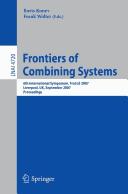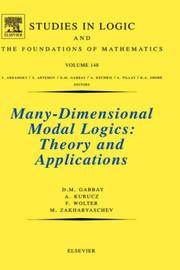| Listing 1 - 5 of 5 |
Sort by
|
Book
ISBN: 3642401635 3642401643 Year: 2013 Publisher: Berlin, Heidelberg : Springer Berlin Heidelberg : Imprint: Springer,
Abstract | Keywords | Export | Availability | Bookmark
 Loading...
Loading...Choose an application
- Reference Manager
- EndNote
- RefWorks (Direct export to RefWorks)
This book constitutes the refereed proceedings of the 19th International Symposium on Fundamentals of Computation Theory, FCT 2013, held in Liverpool, UK, in August 2013. The 29 papers (26 full papers and 3 invited papers) were carefully reviewed and selected from 58 submissions. The papers cover the following topics: algorithms, formal methods, and emerging fields.
Engineering & Applied Sciences --- Computer Science --- Computer science. --- Computers. --- Computer science --- Computer Science. --- Theory of Computation. --- Discrete Mathematics in Computer Science. --- Mathematics. --- Computational complexity --- Information theory --- Information theory. --- Computational complexity. --- Complexity, Computational --- Electronic data processing --- Machine theory --- Communication theory --- Communication --- Cybernetics --- Computer science—Mathematics. --- Automatic computers --- Automatic data processors --- Computer hardware --- Computing machines (Computers) --- Electronic brains --- Electronic calculating-machines --- Electronic computers --- Hardware, Computer --- Computer systems --- Calculators --- Cyberspace --- Discrete mathematics. --- Discrete mathematical structures --- Mathematical structures, Discrete --- Structures, Discrete mathematical --- Numerical analysis --- Informatics --- Science
Book
Abstract | Keywords | Export | Availability | Bookmark
 Loading...
Loading...Choose an application
- Reference Manager
- EndNote
- RefWorks (Direct export to RefWorks)
International tätige Unternehmen sehen sich unterschiedlich restriktiven ökologischen Anforderungen gegenüber. Demgegenüber stehen Forderungen international agierender ökologischer Anspruchsgruppen, möglichst weltweit ein einheitliches ökologisches Vorgehen zu wählen. In diesem Zusammenhang stellt sich die Frage nach einer internationalen Koordination des ökologiegerichteten Unternehmensverhaltens. Die methodisch als konzeptionell-literaturgestützt einzuordnende Arbeit zeigt den ökologiebezogenen Koordinationsbedarf bei internationaler Unternehmenstätigkeit auf und untersucht geeignete Instrumente zur Reduzierung und Deckung dieses Koordinationsbedarfs. Die Arbeit orientiert sich am situativen Kontext der Automobilindustrie und ist mit Erkenntnissen aus Expertengesprächen sowie primär- und sekundärstatistischen Erhebungen unterlegt.
Abgasskandal --- Auto --- Automobilindustrie --- Beispielen --- Dargestellt --- internationalen --- Koordination --- Umwelt --- Umweltmanagement --- Wolter

ISBN: 9783540746201 354074620X 3540746218 Year: 2007 Publisher: Berlin, Germany ; New York, United States : Springer,
Abstract | Keywords | Export | Availability | Bookmark
 Loading...
Loading...Choose an application
- Reference Manager
- EndNote
- RefWorks (Direct export to RefWorks)
Logic, Symbolic and mathematical --- Computer science --- Logique symbolique et mathématique --- Informatique --- Congresses. --- Congrès --- Computer Science --- Mechanical Engineering - General --- Mathematical Theory --- Mechanical Engineering --- Engineering & Applied Sciences --- Mathematics --- Physical Sciences & Mathematics --- Information Technology --- Artificial Intelligence --- Computer science. --- Computer programming. --- Software engineering. --- Computers. --- Mathematical logic. --- Artificial intelligence. --- Computer Science. --- Theory of Computation. --- Artificial Intelligence (incl. Robotics). --- Mathematical Logic and Formal Languages. --- Programming Techniques. --- Software Engineering. --- AI (Artificial intelligence) --- Artificial thinking --- Electronic brains --- Intellectronics --- Intelligence, Artificial --- Intelligent machines --- Machine intelligence --- Thinking, Artificial --- Bionics --- Cognitive science --- Digital computer simulation --- Electronic data processing --- Logic machines --- Machine theory --- Self-organizing systems --- Simulation methods --- Fifth generation computers --- Neural computers --- Algebra of logic --- Logic, Universal --- Mathematical logic --- Symbolic and mathematical logic --- Symbolic logic --- Algebra, Abstract --- Metamathematics --- Set theory --- Syllogism --- Automatic computers --- Automatic data processors --- Computer hardware --- Computing machines (Computers) --- Electronic calculating-machines --- Electronic computers --- Hardware, Computer --- Computer systems --- Cybernetics --- Calculators --- Cyberspace --- Computer software engineering --- Engineering --- Computers --- Electronic computer programming --- Electronic digital computers --- Programming (Electronic computers) --- Coding theory --- Informatics --- Science --- Programming --- Information theory. --- Artificial Intelligence. --- Communication theory --- Communication

ISBN: 9780444508263 0444508260 9780080535784 008053578X 1281048518 9781281048516 9786611048518 Year: 2003 Publisher: Amsterdam : Elsevier,
Abstract | Keywords | Export | Availability | Bookmark
 Loading...
Loading...Choose an application
- Reference Manager
- EndNote
- RefWorks (Direct export to RefWorks)
Modal logics, originally conceived in philosophy, have recently found many applications in computer science, artificial intelligence, the foundations of mathematics, linguistics and other disciplines. Celebrated for their good computational behaviour, modal logics are used as effective formalisms for talking about time, space, knowledge, beliefs, actions, obligations, provability, etc. However, the nice computational properties can drastically change if we combine some of these formalisms into a many-dimensional system, say, to reason about knowledge bases developing in time or moving objects.
Modality (Logic). --- Modality (logic) --- Modality (Logic) --- Modal logic --- Logic --- Nonclassical mathematical logic --- Bisimulation
Book
ISBN: 3030221024 3030221016 Year: 2019 Publisher: Cham : Springer International Publishing : Imprint: Springer,
Abstract | Keywords | Export | Availability | Bookmark
 Loading...
Loading...Choose an application
- Reference Manager
- EndNote
- RefWorks (Direct export to RefWorks)
This Festschrift has been put together on the occasion of Franz Baader's 60th birthday to celebrate his fundamental and highly influential scientific contributions. The 30 papers in this volume cover several scientific areas that Franz Baader has been working on during the last three decades, including description logics, term rewriting, and the combination of decision procedures. We hope that readers will enjoy the articles gathered in Franz's honour and appreciate the breadth and depth of his favourite areas of computer science.
Computer science. --- Artificial intelligence. --- Logic design. --- Information systems. --- Software engineering. --- Mathematical Logic and Formal Languages. --- Artificial Intelligence. --- Logics and Meanings of Programs. --- Computer Appl. in Administrative Data Processing. --- Software Engineering/Programming and Operating Systems. --- Information Systems and Communication Service. --- Computer software engineering --- Engineering --- Design, Logic --- Design of logic systems --- Digital electronics --- Electronic circuit design --- Logic circuits --- Machine theory --- Switching theory --- AI (Artificial intelligence) --- Artificial thinking --- Electronic brains --- Intellectronics --- Intelligence, Artificial --- Intelligent machines --- Machine intelligence --- Thinking, Artificial --- Bionics --- Cognitive science --- Digital computer simulation --- Electronic data processing --- Logic machines --- Self-organizing systems --- Simulation methods --- Fifth generation computers --- Neural computers --- Informatics --- Science --- Description logics. --- Logics, Description --- Knowledge representation (Information theory) --- Predicate (Logic) --- Mathematical logic. --- Computer logic. --- Application software. --- Computers. --- Automatic computers --- Automatic data processors --- Computer hardware --- Computing machines (Computers) --- Electronic calculating-machines --- Electronic computers --- Hardware, Computer --- Computer systems --- Cybernetics --- Calculators --- Cyberspace --- Application computer programs --- Application computer software --- Applications software --- Apps (Computer software) --- Computer software --- Computer science logic --- Logic, Symbolic and mathematical --- Algebra of logic --- Logic, Universal --- Mathematical logic --- Symbolic and mathematical logic --- Symbolic logic --- Mathematics --- Algebra, Abstract --- Metamathematics --- Set theory --- Syllogism --- Machine theory. --- Information technology—Management. --- Computer networks. --- Formal Languages and Automata Theory. --- Computer Science Logic and Foundations of Programming. --- Computer Application in Administrative Data Processing. --- Software Engineering. --- Computer Communication Networks. --- Communication systems, Computer --- Computer communication systems --- Data networks, Computer --- ECNs (Electronic communication networks) --- Electronic communication networks --- Networks, Computer --- Teleprocessing networks --- Data transmission systems --- Digital communications --- Electronic systems --- Information networks --- Telecommunication --- Cyberinfrastructure --- Network computers --- Abstract automata --- Abstract machines --- Automata --- Mathematical machine theory --- Algorithms --- Recursive functions --- Robotics --- Distributed processing
| Listing 1 - 5 of 5 |
Sort by
|

 Search
Search Feedback
Feedback About UniCat
About UniCat  Help
Help News
News